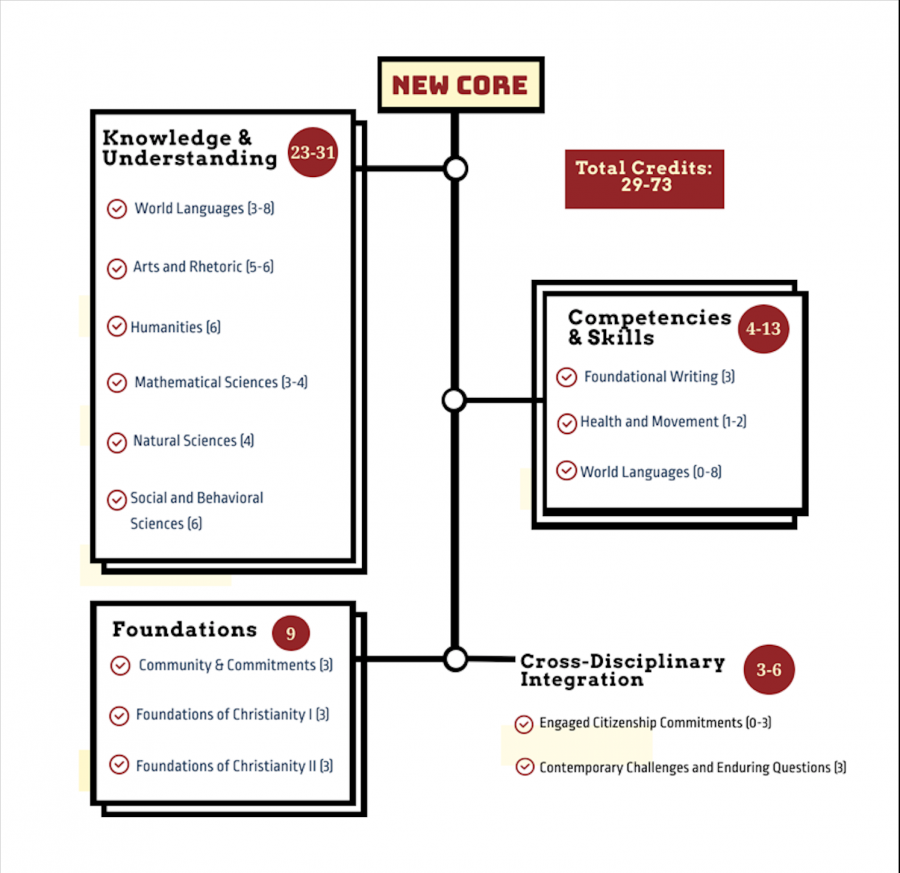New core requirements, explained
The new core includes four main categories: Foundations, Competencies and Skills, Knowledge and Understanding and Cross-Disciplinary Integration.
When did this new curriculum pass? By what margin?
Faculty assembly approved the new core curriculum on Dec. 8, 2020, with 191 votes to approve, 13 votes to refer to the resolver committee and eight votes to abstain. Calvin has been trying to revise its core since the early 2000s. Provost Cheryl Brandsen said, “Changing the general education requirements, or core, as we call it at Calvin, is one of the most challenging changes that academic divisions face. With approval of this core, I think there is a sense of relief among the committee members and a deep gratefulness for the spirit among faculty in this process.”
How many core credits are you required to take? How many were required before?
The former curriculum required 75-91 credits. The new core is roughly half the size at 40-50 credits, which is 30-40% of the credits needed to graduate. All Calvin programs must now complete nearly the same core courses, whereas before nursing, engineering and other pre-professional programs had exemptions.
How is the core organized?
The core is organized under four main categories: Foundations, Competencies and Skills, Knowledge and Understanding and Cross-Disciplinary Integration. Foundations includes three courses: one on Calvin’s Reformed theological background, one on Biblical literacy and basic Christian theology and another that builds on Christian thought.
Competencies and Skills requires one writing course, two gym courses and one to two years of world languages. If students have taken three years of high school language with a B or higher, they can opt out of this requirement.
Knowledge and Understanding includes another world languages course, five credits of arts and rhetoric, two humanities courses in different disciplines, a mathematics course, a natural sciences course, and two social science courses. Of these nine courses, students in B.A. programs must complete eight. Students in B.S. or pre-professional programs can choose from eight courses from ten options, the extra option being an additional natural science course.
Cross-Disciplinary Integration is just three credits and includes a cross-disciplinary course that is meant to tie together what students have learned in their four years at Calvin.
See the table below for an organized chart of the new core.
When will it take effect? Will current students finish under the current core? Can they choose to move?
The new core will take effect for the 2021-2022 academic year. According to Brandsen, a transition and implementation team will be overseeing this, as well as communicating changes to students. Current students will continue in the same core that was in place when they started at Calvin. It is not yet determined whether students will be able to switch out cores, according to Brandsen.
How will various departments be affected?
According to core committee chair and political science professor Joel Westra, the committee was careful “to avoid picking departmental winners and losers.” While there may not be clear winners or losers, the new core will impact each department’s enrollment and offerings differently. For many, the new core brings opportunities to innovate, but also concerns about declining enrollment.
Professor Mark Mulder, chair of the department of sociology, said the department is “pleased that the new core requires two courses in Social and Behavioral Sciences. However, I’m not sure that it means SOC will see as many students as we did in the old core.” According to Mulder, the sociology and social work departments would like to see Diversity and Difference be its own core category.
For the English department, the new core is an opportunity to be more interdisciplinary. “The new core doesn’t force any unwelcome changes on the English Department’s curriculum,” English professor Chad Engbers said, “but it does allow us to consider more ways in which we can plug into the core…The English Department involves multiple disciplines and a vast range of potential material, and the new core offers us more ways to offer more of those things to students.”
Historical studies chair Katherine van Liere told Chimes the department “is excited about many aspects of the new core….The three new “tagged” categories of Diversity and Difference, Sustainability, and Global Regions and Cultures, allow us to innovate even more with our curriculum, and highlight the ways that history, art history and classics really do speak to important present-day concerns.”
According to van Liere, some faculty are worried that the new core will lead to a reduction in overall humanities enrollment. “The added competition,” van Liere said, “should be a good thing for students in many ways, as it will inspire instructors to make their courses attractive…I think [the new core] is designed to get students excited about the humanities. I certainly hope that we’ll continue to see the phenomenon we’ve seen for many years, that the core introduces students to majors they would not have considered before.”
How will majors change in response to the new core?
According to Westra and Brandsen, majors have already started to revise their program requirements in light of the approval. Westra said that the transition team is working with the Educational Policy Committee to make the course proposal process efficient.






